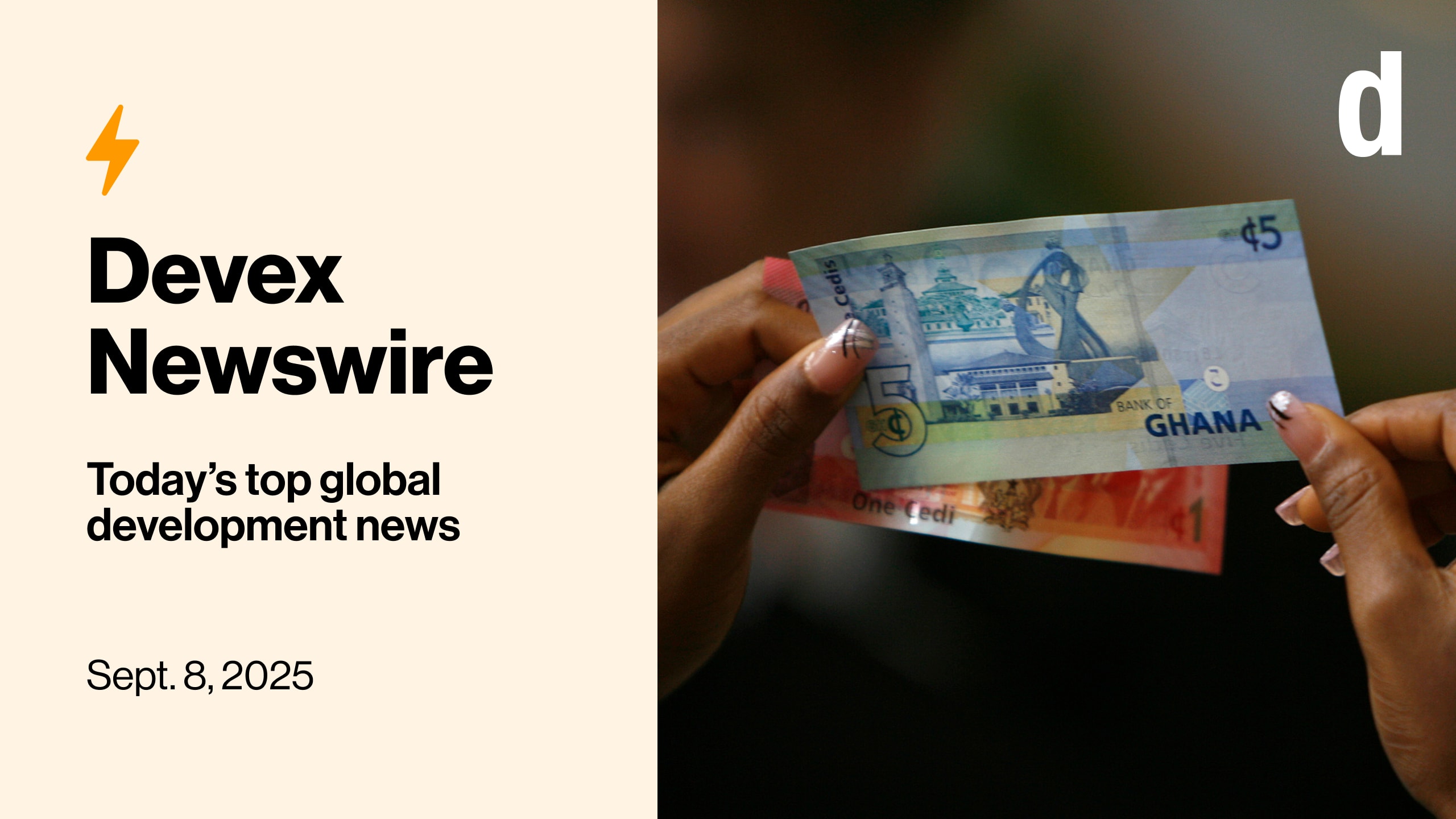Devex Newswire: Could space be the final development frontier?
In today's edition: space programs and their ties to development, the consequences of Europe’s big carbon-curbing scheme, and the bid to come up with new language around HIV.
With Star Trek: Picard Season 3 getting positive reviews, we thought it would be a good time to check in on space programs and their ties to development — from preventing devastating impacts of massive climate events to helping farmers get better yields. Also in today’s edition: Speaking of climate, we have some news on Europe’s new carbon plan and why it’s likely to be bad news for African countries. Also, branding can be critical to fight stigma — so a new generation in southern Africa wants to remake the image around HIV. Upcoming event: Join us on May 16 for a Devex Pro Live webinar to discuss how far USAID has gotten toward its localization targets. If you haven’t already, start your 15-day free trial of Pro today to be able to register for the event. It’s lonely out in space I may be biased, as she was kind enough to sign my copy of her new book, but Rose Croshier’s narrow and practical new volume on space capacity development is really worth a read. Her argument is pretty straightforward: Every government needs some space capacity. Of course, satellites can track hurricanes and prevent loss of life and help nearly every industry. But there’s another level: More countries need to get involved in space to ensure the norms around humanity’s next big adventure will be inclusive. If lower-income nations are left out, they will not have a voice in shaping the frontier of the future. Croshier, who previously worked for the U.S. Air Force and has expertise in space operations, cautions that achieving the Sustainable Development Goals may not be possible without space technology. “We should think of space as another type of infrastructure – like roads or electricity – that has practical, pragmatic, uses,” Croshier tells me. Every country should leverage space “to achieve development goals, to engage the digital economy, to be a part of the greater space ecosystem.” Should we make the SDGs stand for the Space Development Goals? Croshier’s handbook is available for download from the Center for Global Development. Live long and prosper. ICYMI: How a NASA-backed scientist uses satellites to help African farmers Carbon omissions Speaking of the environment, what if I told you that a European Union plan to curb emissions may end up costing African nations $25 billion? My colleague William Worley has the story on the EU’s Carbon Border Adjustment Mechanism, known as CBAM, a new industrial policy that might throw up enough red tape to hurt African exports to the bloc. “We are in a situation where some of the regions that have contributed [least] to climate change happen to find themselves in a situation where they will see some revenue loss as a result of a climate action measure,” says Faten Aggad at the African Climate Foundation. Notably, revenues from the scheme will not be used to support lower-income countries to decarbonize their industry and will instead fund projects in Europe itself. This, even as wealthy nations are still falling short on their pledge to provide $100 billion annually in climate finance to poorer nations. Read: Will Europe's landmark climate scheme make Africa poorer? Sun, sun, sun, here it comes The benefits of solar energy in fragile environments are wide-ranging, argues Will Todman of the Center for Strategic and International Studies, in a new op-ed for Devex. “As well as advancing climate goals,” he writes, “renewables are more resilient to conflicts, accelerate local economic development, and plant the seeds of better governance.” However, Todman warns the window for donors to act can be narrow. He cites the example of Iraq, where slow-moving mechanisms missed a key shot, as opposed to solar successes in Lebanon and Yemen. “While these renewable systems have spread chaotically in the absence of state regulation,” he admits, “they demonstrate the possibility of providing cleaner, cheaper, and more reliable electricity in even the most challenging contexts.” Opinion: How renewables fight corruption in conflict-affected states Brand new For a younger generation, HIV no longer has the dire implications it did for folks who came of age in the 1980s and 1990s. But that doesn’t mean the stigma is gone. For youngsters with the virus, some of whom were born infected, there is now a push to rebrand HIV as something less intimidating and isolating. “As someone that is living with HIV, as soon as I heard that there’s [a campaign] about renaming HIV, I wanted to join because it gets tiring having to explain that you are still a human being even though you carry such a virus with so much stigma,” says Thandolwethu Cindi, a South African TikTok influencer. At the recent AfrikaBurn (that’s South Africa’s version of Burning Man), a group of young people, as well as HIV scientists and advocates, burned statements related to HIV stigma. Their ultimate goal is not to change HIV’s name, but to come up with new language for those who are infected but no longer risk transmitting the virus to others because of successful treatment. Read: Does HIV need a rebrand? + For more content like this, sign up to Devex CheckUp, our free, Thursday newsletter bringing you front-line and behind-the-scenes coverage on global health. Grim, can’t bear it The conflict in Sudan risks spilling effects in other countries in the region, a top USAID official is warning. There have been similar outcries from United Nations Secretary General António Guterres who said violence could propagate in neighboring states. Sarah Charles, who heads USAID’s Humanitarian Assistance Bureau, told a Senate hearing that reports are “grim,” sounding downbeat on the prospects of anything improving. Charles noted that humanitarian needs in the large African nation have been rising since Russia’s invasion of Ukraine, because of its dependency on grain exports from the Black Sea region. “We’d already tried to scale up our assistance in Sudan and it was already going to be hard to sustain that this year given competing demands,” she tells U.S. lawmakers. Read: Effects of Sudan conflict could spill into region, says USAID official How’d you like them, Apple? Brad Setser, widely regarded as a maven of macrofinance and a supporter of development, is not a stranger to many Devex readers. He is set to testify today in the U.S. Congress about “Big Pharma’s Tax Avoidance Schemes.” For those interested in tax reform, especially after pandemic bumper profits, it might be a riveting session. Setser is also following another case of tax schemes — Ireland, which has very low corporate taxes. The European country has long hosted some of the largest U.S. tech companies and reaped “tax manna from heaven.” Apple, for example, books 60% of its taxes in the country. This has led to a budget surplus in Dublin, a rarity in advanced economies. So how does this all tie back to development? “I hoped the Irish would … donate a large share of the windfall to global public goods (pandemic preparation for example, "loss and damage" from climate change or buying World Bank subdebt to support a big increase in green financing),” Setser wrote on Twitter. It’s a long shot, of course, but worth noting. In other news Rights groups are urging Nigerian authorities to suspend the resettlement of people who’ve fled Islamic militants in some regions, citing unmet basic needs in its relocation camps. [VOA] According to a report by the United States Government Accountability Office, Chinese entities received almost one-third of World Bank-funded international contracts, worth $21 billion, between 2013 and 2022, surpassing the value awarded to U.S. companies more than tenfold. [Bloomberg] The United Nations has lifted its order for all Afghan staff to stay at home, more than a month after the Taliban banned Afghan women from working for the global body. [The New Humanitarian] Sign up to Newswire for an inside look at the biggest stories in global development.
With Star Trek: Picard Season 3 getting positive reviews, we thought it would be a good time to check in on space programs and their ties to development — from preventing devastating impacts of massive climate events to helping farmers get better yields.
Also in today’s edition: Speaking of climate, we have some news on Europe’s new carbon plan and why it’s likely to be bad news for African countries. Also, branding can be critical to fight stigma — so a new generation in southern Africa wants to remake the image around HIV.
Upcoming event: Join us on May 16 for a Devex Pro Live webinar to discuss how far USAID has gotten toward its localization targets. If you haven’t already, start your 15-day free trial of Pro today to be able to register for the event.
This article is free to read - just register or sign in
Access news, newsletters, events and more.
Join usSign inPrinting articles to share with others is a breach of our terms and conditions and copyright policy. Please use the sharing options on the left side of the article. Devex Pro members may share up to 10 articles per month using the Pro share tool ( ).
Shabtai Gold is a Senior Reporter based in Washington. He covers multilateral development banks, with a focus on the World Bank, along with trends in development finance. Prior to Devex, he worked for the German Press Agency, dpa, for more than a decade, with stints in Africa, Europe, and the Middle East, before relocating to Washington to cover politics and business.








